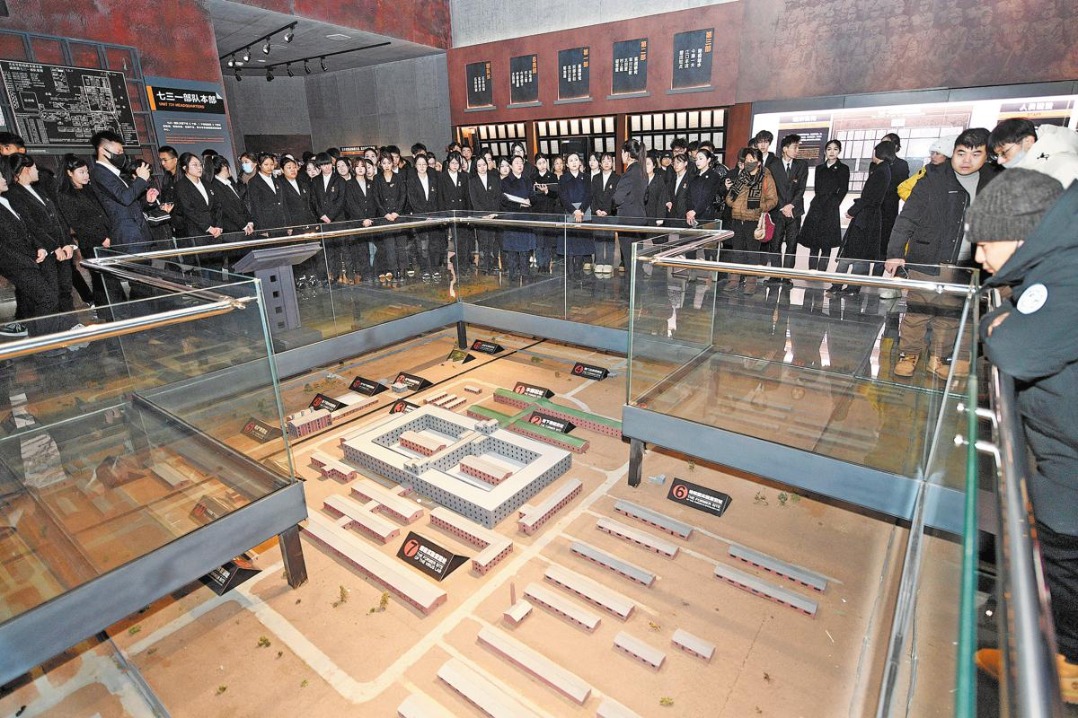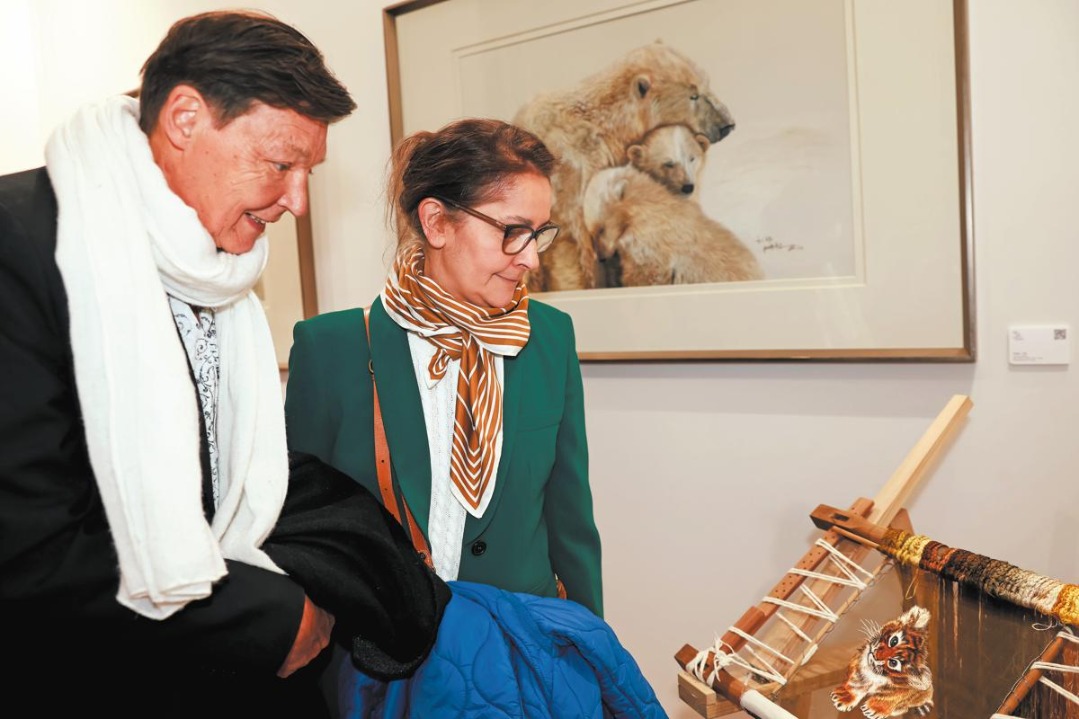Beijing's barbecue

Editor's Note: China is divided into as many culinary regions as there are different ethnic groups. Its geographical diversity and kaleidoscopic cultural profiles contribute to the unending banquet of flavors.
Autumn is the season for meat eaters and it is especially so in the northern parts of China, where the weather is rapidly cooling and bitter cold is approaching and preparing to settle in for the winter months.
In Beijing, the tradition of barbecued meats is long established, with shops which are hundreds of years old still doing a bustling trade selling this old-time favorite.
But barbecue here is very different from the Western concept of large pieces of meat or whole racks of ribs, slathered with thick sauces, roasting over an open fire.
| Beijing's traditional barbecue is a specialty at two time-tested halal restaurants Kaorou Wan and Kaorou Ji. Photos Provided to China Daily |
Beijing's traditional barbecue is more influenced by Muslim chefs, who first entered the capital with caravans that had traveled east along the Silk Road. This is true even now. There are two time-tested halal restaurants famous for barbecue in Beijing.
One is Kaorou Wan, in the southern part of the city at Xuanwumen; the other is Kaorou Ji, near Shishahai in Beihai.
Kaorou simply means barbecued meats, and Wan and Ji are the names of the original founders.
Kaorou Wan is known for its barbecued beef and was first established in 1686, during the reign of the Qing Dynasty (1644-1911) emperor Kangxi. Over the years, it has expanded from one shop to several branches and is currently a State-managed eatery.
It took several generations to bring the restaurant indoors. The founder, surnamed Wan, used to peddle raw beef and mutton on a pushcart. His son figured that barbecued beef would be more profitable, and it was his grandson who finally bought a shop and set up proper tables.
The barbecued meats soon attracted gourmet diners. Celebrity patrons have included opera singer Mei Lanfang and artists Zhang Daqian and Qi Baishi.
The Wan family had two competitors in the early years, Kaorou Ji and Kaorou Wang, but Kaorou Wang did not survive the challenge of time and has since faded from the scene.
Kaorou Ji's own selling point is its lamb. It is also an eatery with a vintage pedigree, having been around since 1848.
Imagine this picture: Diners standing around a griddle of roasting meat, one hand wielding chopsticks, the other supporting a bowl of dipping sauce. As the strips of marinated meat sizzle on the griddle, the diners would pick out their choices, piping hot.
Of course, this is an image from the past. Current day customers are served platters of grilled meat at the table, where they can eat in comfort. The table is set with ingredients for the marinade, including soy sauce, ginger, vinegar, wine, fermented prawn paste, shredded spring onions and coriander leaves.
Traditional side dishes include sweet whole pickled garlic, cucumbers and ox-tongue biscuits, the crisp pancakes that can be split open and stuffed with the grilled meats.
Because its original chefs were butchers, Kaorou Wan prides itself in knowing the best cuts of meat.
The restaurant is known for its tender cuts, and past critics have described the meat "as soft as tofu". This is because only four-year-old bull calves are slaughtered, or cows that have just given birth to a first litter. From these animals, only strip loins from the back of the neck, and the fillets along the backbone, are used.
Next comes the knife work. The meat is cleared of any tendons and gristle, and then sliced into long strips. An experienced chef can divide 500 grams of meat into 150 strips.
As in every barbecue, the fire is what makes it work. In Beijing, dried pine leaves and twigs fuel the fire, as well as fruit wood from the native Chinese jujube and pear.
The marinated meat is placed on the griddle on a bed of spring onions and repeatedly turned until it's cooked. The Beijinger's favorite way is to wash down the grilled meats with a bottle of fiery white spirits so beloved in the hutong.
As for Kaorou Ji, tourists to the scenic Shishahai Lake area may have stumbled unknowingly on the restaurant.
According to records, the eatery had beginnings as humble as its competitor in the south, and it was a Hui chef from the Beijing suburb of Tongzhou who first started peddling his barbecued meats on the banks of the Lotus Market at Shishahai.
He did a roaring business and soon saved enough to buy the restaurant building that bears his name to this day.
Besides its grilled lamb, the shop is also known for its mutton buns, stuffed full of savory meat and onions.
Why did such barbecued meats become so popular in the Forbidden City, of all places? One theory was that the Manchurians, urbanized as they were by 400 years of city living, were still attracted to the rustic memories of grilling meat on an open fire, exactly as their nomadic ancestors had.
Perhaps that is true. My Manchurian husband is already planning an eat-out session of grilled lamb with the family as soon as we return to Beijing.
paulined@chinadaily.com.cn
Manchurian lamb& beef barbecue
Allow at least 500 g of meat per person
2-3 large red onions, cut into thin wedges
2-3 bunches of spring onions, cut diagonally to shred
SPICE MIXTURE
1 teaspoon roasted cumin, roughly ground
1/2 teaspoon cinnamon powder
1 teaspoon chili flakes (optional)
1 teaspoon black pepper
Marinade:
Black vinegar, soy sauce, crushed garlic, Chinese yellow wine, ginger juice, brown sugar, coriander leaves
SIDE DISHES
Whole pickled sweet garlic, cucumbers cut into long thick batons, pita bread or toasted buns
First, trim off any visible tendon from the meat, then cut the pieces into long strips against the grain. Place them on platters and chill until ready to eat.
Prepare the table barbecue or griddle by wiping it with a thin layer of oil. Just before gathering diners at the table, throw some onion wedges and spring onions on the table to start the grill going.
Each diner prepares a personal marinade from the sauces available. They dip the strips of meat into the marinade before placing them on the grill
When the meat is cooked, they can pick it up and start eating with the cucumbers, or stuff it inside the breads. The pickled garlic is to aid digestion, and should be crunched up along with the meat.
Baijiu or white spirits go well with the barbecue on a cool autumn evening or winter's day, but chilled beer goes down just as well.
(China Daily European Weekly 09/22/2017 page20)
Today's Top News
- ASEAN accelerates de-dollarization
- Xi: China, Russia to promote just, equitable intl order
- Why China still anchors global supply chains
- Xi lays out priority tasks for urban development
- Economic growth momentum expected to continue
- Tianzhou 9 embarks on cargo mission to Tiangong































